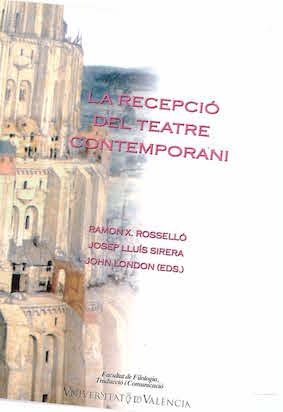La recepción del teatro humorístico en la prensa contemporánea
DOI:
https://doi.org/10.7203/qf-elit.v15i0.3977Paraules clau:
premsa, humor, Tricicle, Pepe Rubianes, Faemino i Cansado Resum
Resum
A partir dels casos de Tricicle, Pepe Rubianes i Faemino i Cansado, l'article examina les constants que es perceben en la recepció del teatre humorístic en la premsa contemporània. La consulta de nombroses entrevistes i ressenyes publicades durant més de vint-i-cinc anys evidencia unes reiterades estratègies dels citats còmics de cara a la promoció dels seus espectacles i, sobretot, el convencionalisme i escàs compromís crític dels periodistes en la realització d'aquests treballs. No obstant això, la consulta d'aquesta documentació resulta imprescindible perquè, entre altres motius, comptem amb una escassa bibliografia acadèmica sobre aquests exemples de l'humor contemporani.
 Descàrregues
Descàrregues
Descàrregues
Com citar
-
Resum244
-
PDF (Español)110
Número
Secció
Llicència
 Este obra está bajo una licencia de Creative Commons Reconocimiento-NoComercial-SinObraDerivada 4.0 Internacional.
Este obra está bajo una licencia de Creative Commons Reconocimiento-NoComercial-SinObraDerivada 4.0 Internacional.
Tots els documents inclosos a OJS són d'accés lliure i propietat dels seus autors i/o institucions editores, i per tant, qualsevol acte de reproducció, comercialització, comunicació pública o transformació total o parcial necessita el consentiment exprés i escrit d'aquests.
________
Authors who publish with this journal agree to the following terms:
- Authors retain copyright and grant the journal right of first publication with the work simultaneously licensed under a Creative Commons Attribution License that allows others to share the work with an acknowledgement of the work's authorship and initial publication in this journal.
- Authors are able to enter into separate, additional contractual arrangements for the non-exclusive distribution of the journal's published version of the work (e.g., post it to an institutional repository or publish it in a book), with an acknowledgement of its initial publication in this journal.
- Authors are permitted and encouraged to post their work online (e.g., in institutional repositories or on their website) prior to and during the submission process, as it can lead to productive exchanges, as well as earlier and greater citation of published work (See The Effect of Open Access).




